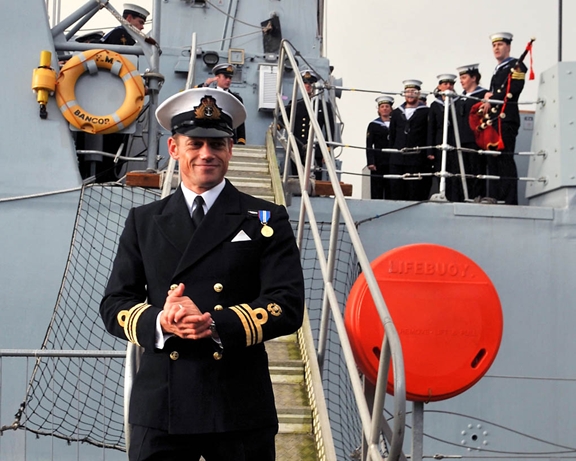The Faslane-based Sandown Class minehunter was welcomed home
by families and friends who braved the bitterly cold winds and heavy
rain as she sailed into HM Naval Base Clyde this morning, 25 November
2011.
Rear Admiral Chris Hockley, Flag Officer Scotland Northern
England & Northern Ireland (FOSNNI) was on hand to congratulate the
ship’s company on their latest deployment.
HMS Bangor sailed to the Mediterranean in June in support of the
NATO Operation Unified Protector off Libya. Her tasks involved scouring
miles of sea bed off the Libya coast as the battle between rebels and
Colonel Gaddafi raged.
The painstaking work led to her finding a 2,400-pound (1000kg)
mine and a torpedo lying on the seabed off the port of Tobruk in eastern
Libya. Both were safely destroyed using the ship’s Sea Fox system – an
underwater drone armed with explosive charges.
Lt Cdr Neil Marriott, Commanding Officer, said,
“HMS Bangor’s Ship’s Company has produced some excellent
results during the past five months off the coast of Libya and their
efforts have significantly aided the safety of Libyan civilians.
"They have spent in excess of 120 days at sea, of which 37
were within range of Pro-Gadaffi Forces’ weapons whilst clearing safe
routes for merchant traffic and the delivery of Humanitarian Aid, and
cleared 2 pieces of ordnance off the coast of Tobruk.”
Bangor did not lose a single day’s work to defects or breakdown
during the summer, despite sailing hundreds of miles at a time and
working round the clock.
Initially bound for duties with NATO in the North Sea, she was retasked to work in the Mediterranean.
Ops Room Supervisor, Petty Officer Steve 'Stirling' Moss, said:
"When we're mine hunting we have several people watching the screens for any contact.
"On the Tobruk task we saw several items which looked about the size of a mine, and two of them turned out to be real.
"It's not a regular thing to happen, so we're really pleased we found them and we were able to destroy them."
After Colonel Gaddafi fell the operational pace dropped, and Bangor was able to complete the final mine hunting task into Sirte.
NATO operations concluded on the 31 October and she commenced her way home. She stopped in Gibraltar off southern Spain last weekend, where
sailors could run to the top of the rock ahead of a Remembrance service
where a wreath was laid at the territory’s Cenotaph. Lt Cdr Marriott said:
“For many, this was their first operational deployment or time
away from family and friends, and they are all deserved of their
forthcoming leave following the very successful mission, for which they
should be rightly proud.”
Commander David Bence, the Commanding Officer of the First Mine Countermeasures Squadron (MCM1) at HMNB Clyde, said:
“Today sees Faslane welcome home a Minehunter from active service in the Mediterranean.
"Her contribution to the NATO mission off Libya has been outstanding and has been far in excess of expectations.
"HMS Bangor’s ships company epitomise everything that is great
about our men and woman, from their stoic response to her short notice
activation to the professional and flexible manner in which they
conducted operations; the country, the RN and their families should be
proud.”
*Notícia publicada al lloc web oficial de la Royal Navy.

